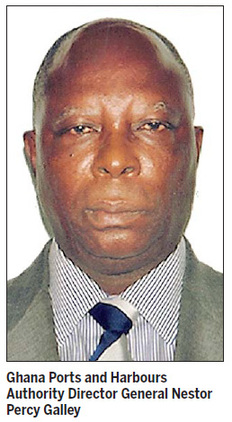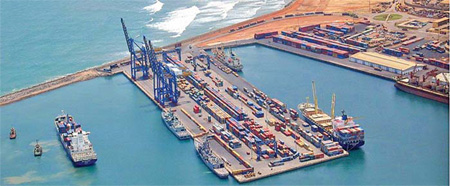News
Nation's port and harbor authority lifts trade
(China Daily)
Updated: 2011-06-10 07:57
 |
Large Medium Small |
|
Ghana is rapidly earning a proud reputation as an efficient transshipment hub for the West Africa region. Provided to China Daily |

Strategically positioned Ghana relies on its ports for trade, industry and now energy
Playing a major role in Ghana's development, and providing excellent sea links for its landlocked neighbors, Ghana Ports and Harbours Authority (GPHA) is the national organization charged with overseeing all port planning, development, management and operations in the country.
As the country has developed at pace in recent years, GPHA has risen to the challenge of growing and handling volumes of cargo passing through the ports. In 2009, the ports handled 12.5 million tons of cargo and in 2010, the total tonnage to be handled stood at an estimated 13 million tons.
GPHA, in its master plans for the two ports of Tema and Takoradi, endeavors to build bigger and better facilities, especially in Takoradi Port as a result of the oil find off Cape Three Points in the Western Region.
Responsible for Tema Port, Tema Fishing Harbour, Golden Jubilee Terminal, Tema, Takoradi Port and the Sekondi Fishing Harbour, GPHA continues to implement master plans that will contribute to the Ministry of Transport's overall vision to make Ghana the maritime and overall transport hub in the sub region.
Thus all types of transport - sea/maritime, rail, road and air - are being integrated into one seamless mode to facilitate the movement of goods, passengers and services for Ghana's economic development.
With around 90 percent of Ghana's foreign trade being carried by maritime transport, it is an important time for GPHA, which is firmly committed to Ghana's success as an energy producer to provide adequate facilities at the ports, especially Takoradi Port, to support the emerging oil and gas industry.
"Although the ports are wholly owned by government, the act which established the authority mandates it to operate as a viable commercial entity," Nestor Percy Galley, director general of GPHA explained. "We are currently working on the expansion of the ports of Tema and Takoradi. We are also working with Ghana National Petroleum Company (GNPC) and other state institutions to create a deep sea port to serve the oil and gas industry and other industrial activities to be developed in the Western Region.
"We expect financial support from the government for our expansion and modernization projects, as well as the deep sea project. The funds from the China Development Bank (CDB), which total $13 billion, will be used for the port development and expansion projects among others, including the expansion of the railway system and development of the energy and oil sectors."
Securing energy
Situated 230 kms from the capital, Accra, the port of Takoradi will continue to play a crucial role in the development of the oil fields until the new deep sea port is completed, although it needs refurbishment, expansion and modernization to play a more active role.
Clearance of cargo has been simplified by the Ghana Customs, Excise and Preventive Service (CEPS) with the introduction of the Ghana Community Network - GCNet - electronic clearing system. It now takes just a few hours to clear goods if all documentation is complete.
Cargo to landlocked countries is also monitored using an electronic satellite tracking system. GPHA is also improving upon its I.I platform to ensure the fast processing of documentation, all aimed at cutting down on the cost of doing business in the ports. "In terms of efficiency and productivity in the ports, Tema Port is comparable to that of most developed countries. Port prices and charges are also competitive," N.P. Galley said. "We also offer a lot of incentives for transit and transshipment cargo passing through.
"The Bui Dam is a major example of China's presence in Ghana and the machinery for the project would be shipped through the ports. We believe that economic activities and cooperation between the two countries will increase since China is a big market and an economic giant."
The financial assistance provided to Ghana will boost economic activity in the country and lead to more trade between both countries from which the ports will benefit.
Tema Port, situated along the Gulf of Guinea on the Atlantic Ocean is 30 km from the capital city of Ghana, Accra. Tema has port facilities for bulk break bulk, general cargo and containers. The Container Terminal, which came on line in 2007, is equipped with state-of-the-art ship to shore (STS) container cranes, yard gantries and computerized operation systems.
The port handles a wide range of products from crude oil at the oil berth or the SBM located 15 km outside the port, petroleum products, cement, iron and steel, aluminum and aluminum products.
It also handles textiles and containers among others for both domestic trade and transit markets of the landlocked Sahelian countries, north of Ghana.
Both Tema and Takoradi Ports are earmarked for expansion in accordance with the master plans for both ports. A consulting firm is being appointed to carry out the detailed designs for tendering. The projects will commence by mid 2011.
The facilities to be provided in Takoradi include: Oil Service Terminal and Supply Base; Bulk Cargo Terminals for export of ores such as manganese and bauxite and imports like clinker, quick lime and wheat; General cargo terminals with transit sheds for storage of break bulk cargo; Open stacking areas for plant and machinery, iron and steel products; Container Terminals with STS cranes and yard gantries for handling containers; Passenger Terminal for Cruise ships.
For Tema, similar facilities will be provided except the Oil Service Terminal and Supply Base.
Reducing traffic costs
To reduce the cost of doing business in its ports, GPHA is installing a new IT platform, which will speed up transactions in the port. The GCNet, installed by CEPS, has greatly facilitated clearance of goods from the ports. Goods can be cleared within a few hours when all documentation is correct instead of the days and weeks it took in the past to do so.
Electronic tracking via satellite is also being used to monitor transfer of goods from the port to the bonded warehouses outside the port premises instead of using customs escorts and to the landlocked transit countries.
A major shift which will take place in the near future is how goods are transported to the regional landlocked countries of Burkina Faso, Mali and Niger which depend on Ghana's ports and road systems for their goods.
The Ministry of Transport is working on an integrated transport system where the Volta Lake will be linked to Tema port via rail so that goods can be transported by rail to Akosombo; by ferries on the Volta Lake to the northern region, then by road to their final destinations. There are also plans to extend the railway system to the north. This will facilitate movement of large volumes of cargo cheaply.
Using the railway and the Volta Lake will not only reduce the cost of transportation but will also take out a lot of the trucks from Ghana's roads, thus reducing accidents on the roads and the emission of greenhouse gases into the atmosphere.
GPHA and Ghana Shippers Authority are also working on the development of the Boankra Inland Port, a project which is aimed at decongesting the ports and reducing the transit time of goods to the northern sector and therefore for importers/exporters.
The Boankra Inland Port will be linked by rail and all customs documentation and clearance will be carried out there.
Chinese links strengthened
As trade and industry between China and Ghana increases, activity within the ports will obviously grow. This is something N.P. Galley is excited about.
"A lot of our business people are buying from China now. The Bui Dam Project is a major example of China's presence in Ghana. We believe the equipment, plant and machinery for the project will pass through our ports and the volume of business will increase."
The director general is visibly upbeat about the ports and indeed the country's future.
"Strategically, Ghana is in excellent position, equidistant from most parts of the world and therefore extremely accessible", he said.
"We enjoy political and economic stability and our people are friendly. The climate for investment is good; therefore we could become the 'Golden Gateway'. We have gold and black gold is around the corner.
"Why shouldn't we become the Golden Gateway?"

(China Daily 06/10/2011 page6)
| 分享按钮 |
